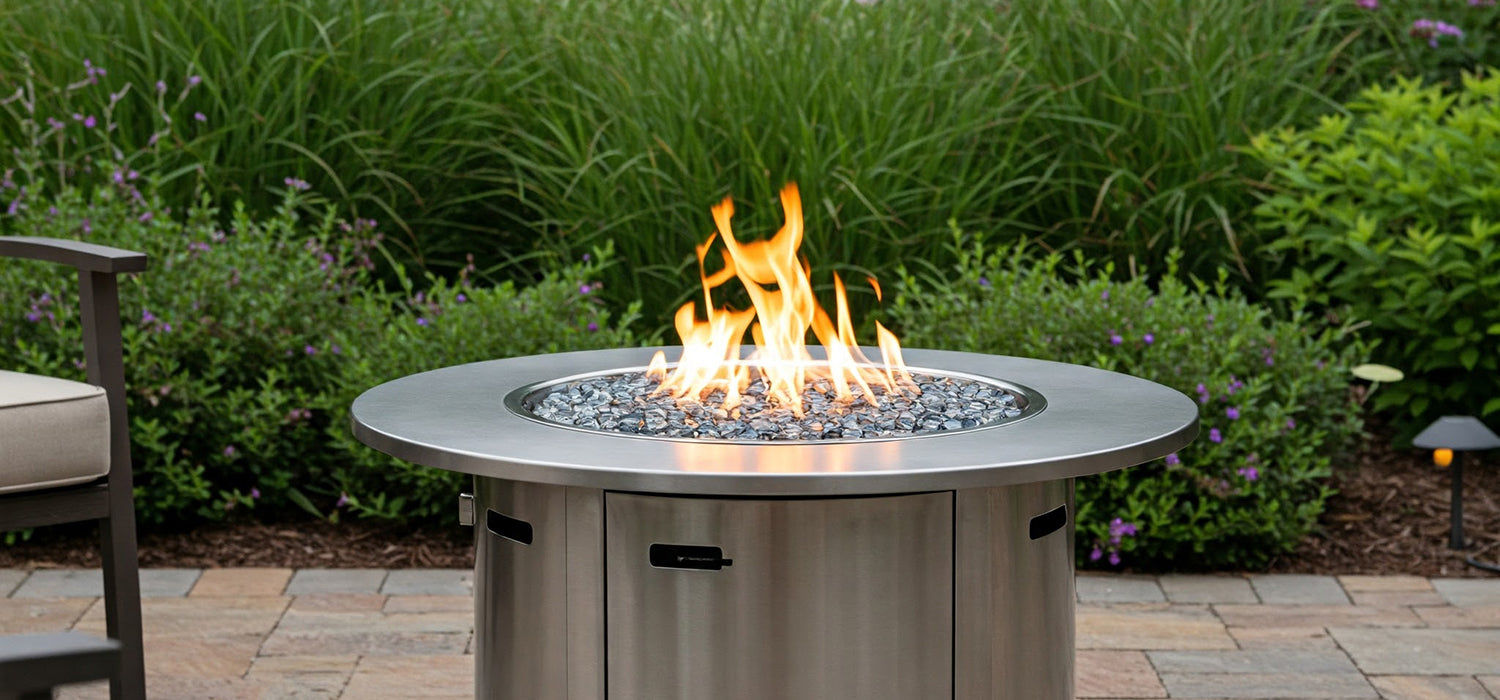
Choosing the Perfect Gas Fire Pit for Your Garden
Looking to spice up your garden? A gas fire pit for your garden is the answer! Imagine cosy nights around a warm, flickering flame—no hassle, no mess. Whether it’s a sleek fire table or a classic pit, this addition brings style, warmth, and year-round fun to your outdoor oasis!
Choosing a Gas Fire Pit for Your Garden
A garden is more than just a patch of grass—it’s your personal retreat, a place to unwind and entertain. And what better way to elevate the space than with a gas fire pit? But with so many options out there, how do you know which one’s right for you?
Let’s walk through some key things to consider when choosing a gas fire pit for your garden.
Size and Design
Matching Garden Style and Size
When picking your fire pit, think about the overall vibe of your garden. If you’ve got a sprawling garden, a large fire table can become a stunning centrepiece, adding both warmth and elegance to the space. On the other hand, if your garden’s on the smaller side, you’ll want to go for something more compact—something that blends in rather than overpowers. A smaller fire pit doesn’t mean less style; it just means you’ve got a design that works in harmony with the rest of your outdoor space.
Portable vs. Built-in Options
Do you love to change things up, or do you prefer a more permanent set-up? A portable gas fire pit is a fantastic option if you like the flexibility to move your fire pit around. It’s easy to pick up and shift depending on where the party is. But, if you're after a more refined look, built-in fire pits offer that sleek, permanent feature. Both options have their perks; it’s all about what works best for your garden’s layout.
Heat Output and Coverage
Adjusting BTU for Garden Size
Heat output is an essential factor when choosing a gas fire pit, especially when you want to make sure your fire pit keeps you warm. BTU (British Thermal Unit) is a measure of how much heat a fire pit can generate, and you’ll want to pick one with the right output for the size of your garden. A high BTU rating works well for larger spaces, while a lower rating will provide just enough warmth for a smaller setting. You don’t need a roaring inferno if your garden is only a few metres wide!
Ensuring Comfortable Heat Distribution
There’s nothing worse than sitting too close to a fire and being scorched, or standing too far away and feeling the chill. Many modern gas fire pits come with features that allow you to control the flame height, ensuring that the heat is evenly distributed across your seating area. This way, everyone stays comfy, and your outdoor gatherings stay warm and enjoyable, no matter the weather.
Safety Considerations for Garden Use
Safety should always come first when you’re using a fire pit. Luckily, there are a few simple precautions you can take to ensure your garden stays safe while you enjoy your new gas fire pit.
Clearance and Distance
Maintaining a Safe Distance from Plants and Structures
It’s tempting to place your fire pit right in the middle of your garden, but there are a few things to keep in mind. Always make sure there’s a safe distance between your fire pit and anything that could catch fire—plants, trees, or even your shed. As a rule of thumb, aim for at least 10 feet of space between your fire pit and anything flammable. Trust me, it’s much better to be safe than sorry!
Protecting from Wind and Weather
Wind can be a tricky customer when it comes to outdoor fire pits. A gust of wind can send embers flying, and before you know it, your peaceful garden setting has turned into an outdoor disaster. To keep things under control, position your fire pit in a sheltered spot or invest in wind guards. These nifty features keep the flame steady and reduce the risk of fire hazards caused by unpredictable weather.
Surface Protection
Protecting Garden Surfaces from Heat Damage
Heat from your fire pit can damage your garden surfaces if you’re not careful. Whether you’ve got a beautiful stone patio or a well-maintained lawn, a fire pit can cause burns or marks if it’s placed directly on the ground. To prevent this, make sure you use a heat-resistant mat or stone beneath your fire pit. It’s a simple fix that keeps your surfaces looking great and extends the life of your fire pit.
Using Heat-Resistant Mats or Surfaces
A heat-resistant mat is an excellent solution for preventing heat damage. They come in various sizes to fit under your fire pit and act as a protective layer. It’s an easy, affordable way to protect your garden’s surfaces and ensure that your fire pit stays secure no matter how hot the flames get.
Fuel Options and Usage
Choosing the right fuel source is crucial to keeping your fire pit running smoothly. Let’s take a closer look at the two main options: propane and natural gas.
Propane vs. Natural Gas
Small Propane Tanks for Portability
If you’re after portability, propane’s your best bet. Small propane tanks are easy to move around and swap out when they run dry, making them ideal for those who like flexibility. You can take your fire pit wherever you go—whether it’s to the back of the garden for a quiet night or to a friend’s house for a barbecue.
Natural Gas Line for Continuous Supply
On the other hand, if you’re looking for convenience and don’t want to worry about refilling tanks, natural gas is the way to go. By connecting your fire pit to your home’s gas line, you can enjoy a continuous, hassle-free fuel supply. It’s a more permanent option, but it ensures that your fire pit is always ready to go without the need for constant maintenance.
Flame Adjustment and Control
Adjusting Flame Height for Desired Ambiance
One of the best things about gas fire pits is the ability to adjust the flame height. Whether you want a small, romantic glow or a larger flame for extra warmth, you can control the intensity to suit your mood. This feature makes gas fire pits super versatile, giving you the flexibility to create just the right atmosphere for any occasion.
Maintenance and Cleaning
Taking care of your fire pit is key to ensuring it lasts for years to come. Here’s how to keep it in tip-top shape.
Cleaning Burner and Surface
Removing Debris and Spills
After you’ve enjoyed a few cosy evenings by the fire, it’s important to clean the burner and surrounding area. Sweep away any debris, like leaves or dirt, and wipe down the surface to prevent grease or ash buildup. This keeps your fire pit looking fresh and ensures it burns efficiently.
Checking for Gas Leaks
Using a Soap Solution
Before firing up your gas fire pit each season, give it a quick safety check. One of the most important things to check for is gas leaks. To do this, mix up a little soapy water and apply it to the connections. If you spot bubbles forming, you’ve got a leak and should get it repaired before using the fire pit.
Conclusion
A gas fire pit is a brilliant way to add warmth, style, and atmosphere to your garden. With the right size, design, and fuel options, your garden will become an inviting space to enjoy all year round. Just remember to take a few safety precautions and do some regular maintenance to keep your fire pit in perfect working order.
So, what are you waiting for? Whether you’re relaxing with friends or enjoying a quiet evening by yourself, a gas fire pit is the ideal way to elevate your garden experience.
Other content we think you'll love
- Gas Fire Pit for S’mores: Your Guide to Gooey Backyard Treats
- Can You Use a Fire Pit When It’s Windy? (Yes—Here’s How to Stay Safe and Cosy)
- The Ultimate Guide to Choosing a Tabletop Gas Fire Pit
- Gas Fire Pit for Small Patios: The Perfect Solution for Cosy Outdoor Vibes
- Gas Fire Pit for Covered Porch: Enjoy Cozy Warmth All Year Round
- Gas Fire Pit for RV: Your Cosy Companion on the Road
- The Best Portable Gas Fire Pit for Motorhome Camping: A Complete Guide
- The Ultimate Guide to Choosing a Gas Fire Pit for Camping
- Are Fire Pit Dining Tables Worth It?
- The Ultimate Guide to Cooking on a Gas Fire Pit
- Are Fire Tables Worth It? Here's What You Need to Know Before Buying
- Are Fire Tables Warm Enough? A Complete Guide to Heat Output
- The Ultimate Guide to Popcorn Making with a Fire Table
- Can You Roast Marshmallows Over a Gas Fire Pit?
- Are Gas Fire Pit Tables Any Good? A Full Guide to Cosy Outdoor Living
- When to Use a Fire Pit: Timing is Everything!

